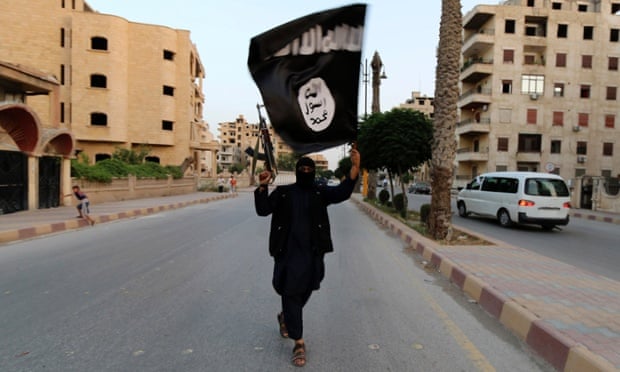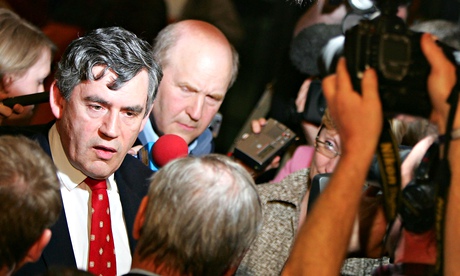'People will forgive you for being wrong, but they will never forgive you for being right - especially if events prove you right while proving them wrong.' Thomas Sowell
Search This Blog
Showing posts with label Iraq. Show all posts
Showing posts with label Iraq. Show all posts
Tuesday, 16 June 2015
Perhaps the world's conspiracy theorists have been right all along
Alex Proud in The Telegraph
Conspiracy theories used to be so easy.
The Iraq War
Thursday, 13 November 2014
How a decade of misguided war has corroded the idea of Britain
Persistent unease about the legitimacy of military action in Iraq and Afghanistan has left a toxic political legacy

Few would deny that for all the wanton slaughter of the first world war, the conflict acted as a catalyst for profound change. The experience of war on such a scale had an immense and lasting impact on social relations and political ideas. Britain was shielded from the worst of the consequences that affected the continent, not least because victory provided a justification in itself for war, and because British values appeared to have been vindicated.
For over a decade now, Britain has been apparently engaged in another “war for civilisation”. Though different in character and intensity, this engagement is at the same time more protracted, less tangible in its aims, and perhaps more important in its consequences. While the British withdrawal from Afghanistan last month closed a chapter, it did not provide a conclusion. If the British like their wars short and sharp, with a clear cause and a victory they can celebrate, then Iraq, Afghanistan, and its associated interventions, along with the seemingly open-ended commitments they represent, have been a major source of disaffection.
As the interminable course of the Chilcott inquiry suggests, there are a great many outstanding questions on the motivations, means and methods that launched Britain on this most dangerous of political trajectories.
Some years ago, at a meeting in the House of Commons, I suggested that the war in Iraq, and particularly its opaque causes, was leading to a dangerous loss of moral authority abroad that could rebound on domestic politics. A senior Labour MP responded with a confidence that surprised me: Britons don’t vote on issues of foreign policy,she said, and the war in Iraq would have no significant effect. The return of a Labour majority in 2005 no doubt bolstered that view.
Yet the remark also seemed profoundly out of touch with the undercurrent of unease that was building most clearly among the professionals who provide the intellectual and administrative backbone of the British state and wider society. What was most striking about this malaise was that it was affecting people who had hitherto enjoyed a positive relationship with the idea of Britain. This was not some containable peripheral group susceptible to radicalisation; it was something more fundamental to the body politic, something more subtle. Many had put their faith in New Labour and everything Tony Blair’s “cool Britannia” represented. Iraq, emblematic of the broader global war on terror, tested that faith to breaking point. Many have come, slowly but surely, to feel a sense of betrayal.
I invite anyone who finds it difficult to believe that this tear in the moral fabric of the British state has had no repercussions on domestic politics to take a look at developments in Scotland. Far from being marginal to the political process, as some in Westminster like to believe, it might be better to see events in Scotland as a harbinger of things to come should complacency persist and political stupidity take hold.
Among the politicians to seize on the sense of unease was Alex Salmond. While some cautioned against the folly of the war, Salmond – then an MP at Westminster – went for the jugular and attacked Blair directly in a manner calculated to draw the attention of those veering towards disaffection. As the war dragged on and victory seemed ever more remote, Salmond’s attempt to impeach Blair seemed increasingly to strike a chord with the public. Indeed his criticisms have felt only more appropriate with the passage of time as the perception grows that a war intended to make us safe from terrorism has encouraged homegrown radicalisation while the man seen as culpable spends more time making money than making peace.
Salmond’s attacks were matched by an incompetence on the part of New Labour that was breathtaking in its short-sightedness. The Scots are rightly proud of their contributions to the British army, and the army has traditionally recruited well in Scotland, which boasts some of the most famous regiments, including the Black Watch. But they expect some respect in return.
To paraphrase Barack Obama, people aren’t necessarily against wars – just dumb wars; they don’t expect their sons to be sent to fight on a false prospectus. The decision of the then defence secretary, Geoff Hoon, to announce the effective abolition of the Black Watch while the unit on active combat in Iraq went down like a lead balloon. The “military covenant”, now enshrined in law, was found to be sadly wanting. The mood in Scotland was in some ways mirrored by scenes in Wooton Bassett. As affection for the soldiers served and respect for the armed forces have risen, so has contempt for the political leadership behind Britain’s continuing wars. By 2007 the SNP had made big gains, not least in areas traditionally associated with key regiments, allowing the party for the first time to replace Labour as the governing party in Scotland. Salmond was returned as first minister, and relentlessly condemned “illegal wars” in which, he assured his public, an independent Scotland would not have become embroiled. It became a central tenet of the independence campaign that was to follow the SNP landslide at the expense of Labour in 2011.
It was not so much that Britain was broken; it was that its embrace of ill-defined military interventions showed it was morally bankrupt and beyond repair. This view was surprisingly common among professionals, and the SNP courted them with a discipline, some might argue, cynicism that would have made New Labour proud. There is irony in the fact that the SNP is on the brink of disestablishing Labour from its Scottish power base by applying methods, tactics and slogans learned from a Labour electoral machine at its strategic best.
Yet appreciation of the strategic lie of the land is woefully missing from the current political class in Westminster. If the SNP’s rise is anything to go by, then foreign policy and war have consequences that, while not immediate, are all the more profound for it. Among the many inventions credited to the Scots, perhaps the greatest was the idea of Great Britain as a political construct. The September 2014 referendum has shown that among its progenitors there is life yet in the idea.
But the result should never have been as close as it was, and there is no doubt that the idea of Britain was under serious attack – not from without but from within: not only from critics but from pro-union politicians unable effectively to articulate a sense of what Britain means. Britain’s modern wars are by no means the only cause of our difficulties, but their mishandling has arguably tipped the balance from self-criticism to self-loathing. This country still lacks closure. We need to talk about the war.
Friday, 24 October 2014
The truth about evil
John Gray in The Guardian
When Barack Obama vows to destroy Isis’s “brand of evil” and David Cameron declares that Isis is an “evil organisation” that must be obliterated, they are echoing Tony Blair’s judgment of Saddam Hussein: “But the man’s uniquely evil, isn’t he?” Blair made this observation in November 2002, four months before the invasion of Iraq, when he invited six experts to Downing Street to brief him on the likely consequences of the war. The experts warned that Iraq was a complicated place, riven by deep communal enmities, which Saddam had dominated for over 35 years. Destroying the regime would leave a vacuum; the country could be shaken by Sunni rebellion and might well descend into civil war. These dangers left the prime minster unmoved. What mattered was Saddam’s moral iniquity. The divided society over which he ruled was irrelevant. Get rid of the tyrant and his regime, and the forces of good would prevail.
When Barack Obama vows to destroy Isis’s “brand of evil” and David Cameron declares that Isis is an “evil organisation” that must be obliterated, they are echoing Tony Blair’s judgment of Saddam Hussein: “But the man’s uniquely evil, isn’t he?” Blair made this observation in November 2002, four months before the invasion of Iraq, when he invited six experts to Downing Street to brief him on the likely consequences of the war. The experts warned that Iraq was a complicated place, riven by deep communal enmities, which Saddam had dominated for over 35 years. Destroying the regime would leave a vacuum; the country could be shaken by Sunni rebellion and might well descend into civil war. These dangers left the prime minster unmoved. What mattered was Saddam’s moral iniquity. The divided society over which he ruled was irrelevant. Get rid of the tyrant and his regime, and the forces of good would prevail.
If Saddam was uniquely evil 12 years ago, we have it on the authority of our leaders that Isis is uniquely evil today. Until it swept into Iraq a few months ago, the jihadist group was just one of several that had benefited from the campaign being waged by western governments and their authoritarian allies in the Gulf in support of the Syrian opposition’s struggle to overthrow Bashar al-Assad. Since then Isis has been denounced continuously and with increasing intensity; but there has been no change in the ruthless ferocity of the group, which has always practised what a radical Islamist theorist writing under the name Abu Bakr Naji described in an internet handbook in 2006 as “the management of savagery”.
Ever since it was spun off from al-Qaida some 10 years ago, Isis has made clear its commitment to beheading apostates and unbelievers, enslaving women and wiping out communities that will not submit to its ultra-fundamentalist interpretation of Islam. In its carefully crafted internet videos, it has advertised these crimes itself. There has never been any doubt that Isis practises methodical savagery as an integral part of its strategy of war. This did not prevent an abortive attempt on the part of the American and British governments in August of last year to give military support to the Syrian rebels – a move that could have left Isis the most powerful force in the country. Isis became the prime enemy of western governments only when it took advantage of the anarchy these same governments had created when they broke the state of Iraq with their grandiose scheme of regime change.
Against this background, it would be easy to conclude that talk of evil in international conflicts is no more than a cynical technique for shaping public perceptions. That would be a mistake. Blair’s secret – which is the key to much in contemporary politics – is not cynicism. A cynic is someone who knowingly acts against what he or she knows to be true. Too morally stunted to be capable of the mendacity of which he is often accused, Blair thinks and acts on the premise that whatever furthers the triumph of what he believes to be good must be true. Imagining that he can deliver the Middle East and the world from evil, he cannot help having a delusional view of the impact of his policies.

Here Blair is at one with most western leaders. It’s not that they are obsessed with evil. Rather, they don’t really believe in evil as an enduring reality in human life. If their feverish rhetoric means anything, it is that evil can be vanquished. In believing this, those who govern us at the present time reject a central insight of western religion, which is found also in Greek tragic drama and the work of the Roman historians: destructive human conflict is rooted in flaws within human beings themselves. In this old-fashioned understanding, evil is a propensity to destructive and self-destructive behaviour that is humanly universal. The restraints of morality exist to curb this innate human frailty; but morality is a fragile artifice that regularly breaks down. Dealing with evil requires an acceptance that it never goes away.
No view of things could be more alien at the present time. Whatever their position on the political spectrum, almost all of those who govern us hold to some version of the melioristic liberalism that is the west’s default creed, which teaches that human civilisation is advancing – however falteringly – to a point at which the worst forms of human destructiveness can be left behind. According to this view, evil, if any such thing exists, is not an inbuilt human flaw, but a product of defective social institutions, which can over time be permanently improved.
Paradoxically, this belief in the evanescence of evil is what underlies the hysterical invocation of evil that has lately become so prominent. There are many bad and lamentable forces in the world today, but it is those that undermine the belief in human improvement that are demonised as “evil”. So what disturbs the west about Vladimir Putin, for example, is not so much the persecution of gay people over which he has presided, or the threat posed to Russia’s neighbours by his attempt to reassert its imperial power. It is the fact that he has no place in the liberal scheme of continuing human advance. As a result, the Russian leader can only be evil. When George W Bush looked into Putin’s eyes at a Moscow summit in May 2002, he reported, “I was able to get a sense of his soul”. When Joe Biden visited the Kremlin in 2011, he had a very different impression, telling Putin: “Mr Prime Minister, I’m looking into your eyes, and I don’t think you have a soul.” According to Biden, Putin smiled and replied, “We understand each other.” The religious language is telling: nine years earlier, Putin had been a pragmatic leader with whom the west could work; now he was a soulless devil.
It’s in the Middle East, however, that the prevailing liberal worldview has proved most consistently misguided. At bottom, it may be western leaders’ inability to think outside this melioristic creed that accounts for their failure to learn from experience. After more than a decade of intensive bombing, backed up by massive ground force, the Taliban continue to control much of Afghanistan and appear to be regaining ground as the American-led mission is run down. Libya – through which a beaming David Cameron processed in triumph only three years ago, after the use of western air power to help topple Gaddafi – is now an anarchic hell-hole that no western leader could safely visit. One might think such experiences would be enough to deter governments from further exercises in regime change. But our leaders cannot admit the narrow limits of their power. They cannot accept that by removing one kind of evil they may succeed only in bringing about another – anarchy instead of tyranny, Islamist popular theocracy instead of secular dictatorship. They need a narrative of continuing advance if they are to preserve their sense of being able to act meaningfully in the world, so they are driven again and again to re-enact their past failures.
Many view these western interventions as no more than exercises in geopolitics. But a type of moral infantilism is no less important in explaining the persisting folly of western governments. Though it is clear that Isis cannot be permanently weakened as long as the war against Assad continues, this fact is ignored – and not only because a western-brokered peace deal that left Assad in power would be opposed by the Gulf states that have sided with jihadist forces in Syria. More fundamentally, any such deal would mean giving legitimacy to a regime that western governments have condemned as more evil than any conceivable alternative. In Syria, the actual alternatives are the survival in some form of Assad’s secular despotism, a radical Islamist regime or continuing war and anarchy. In the liberal political culture that prevails in the west, a public choice among these options is impossible.
There are some who think the very idea of evil is an obsolete relic of religion. For most secular thinkers, what has been defined as evil in the past is the expression of social ills that can in principle be remedied. But these same thinkers very often invoke evil forces to account for humankind’s failure to advance. The secularisation of the modern moral vocabulary that many believed was under way has not occurred: public discourse about good and evil continues to be rooted in religion. Yet the idea of evil that is invoked is not one that features in the central religious traditions of the west. The belief that evil can be finally overcome has more in common with the dualistic heresies of ancient and medieval times than it does with any western religious orthodoxy.
* * *
A radically dualistic view of the world, in which good and evil are separate forces that have coexisted since the beginning of time, was held by the ancient Zoroastrians and Manicheans. These religions did not face the problem with which Christian apologists have struggled so painfully and for so long – how to reconcile the existence of an all-powerful and wholly good God with the fact of evil in the world. The worldview of George W Bush and Tony Blair is commonly described as Manichean, but this is unfair to the ancient religion. Mani, the third-century prophet who founded the faith, appears to have believed the outcome of the struggle was uncertain, whereas for Bush and Blair there could never be any doubt as to the ultimate triumph of good. In refusing to accept the permanency of evil they are no different from most western leaders.

The west owes its ideas of evil to Christianity, though whether these ideas would be recognised by Jesus – the dissident Jewish prophet from whose life and sayings St Paul conjured the Christian religion – is an open question. The personification of evil as a demonic presence is not a feature of biblical Judaism, where the figure of Satan appears chiefly as a messenger or accuser sent by God to challenge wrongdoers. Despite the claims of believers and advances in scholarship, not enough is known to pronounce with any confidence on what Jesus may himself have believed. What is clear is that Christianity has harboured a number of quite different understandings of evil.
A convert from Manicheism, St Augustine established a powerful orthodoxy in the fourth century when he tried to distance Christianity from dualism and maintained that evil was not an independent force coeval with good but came into the world when human beings misused the gift of free will. Reflecting Augustine’s own conflicts, the idea of original sin that he developed would play a part in the unhealthy preoccupation with sexuality that appears throughout most of Christianity’s history. Yet in placing the source of evil within human beings, Augustine’s account is more humane than myths in which evil is a sinister force that acts to subvert human goodness. Those who believe that evil can be eradicated tend to identify themselves with the good and attack anyone they believe stands in the way of its triumph.
Augustine had an immense influence, but dualistic views in which evil exists as an independent force have erupted repeatedly as heretical traditions within Christianity. The Cathar movement that developed in parts of Europe in the 13th century revived a Manichean cosmogony in which the world is the work not of a good God but instead of a malevolent angel or demi-urge. A rival heresy was promoted by the fourth century theologian Pelagius, an opponent of Augustine who denied original sin while strongly affirming free will, and believed that human beings could be good without divine intervention. More than any of the ancient Greek philosophers, Pelagius put an idea of human autonomy at the centre of his thinking. Though he is now almost forgotten, this heretical Christian theologian has a good claim to be seen as the true father of modern liberal humanism.
In its official forms, secular liberalism rejects the idea of evil. Many liberals would like to see the idea of evil replaced by a discourse of harm: we should talk instead about how people do damage to each other and themselves. But this view poses a problem of evil remarkably similar to that which has troubled Christian believers. If every human being is born a liberal – as these latter-day disciples of Pelagius appear to believe – why have so many, seemingly of their own free will, given their lives to regimes and movements that are essentially repressive, cruel and violent? Why do human beings knowingly harm others and themselves? Unable to account for these facts, liberals have resorted to a language of dark and evil forces much like that of dualistic religions.
The efforts of believers to explain why God permits abominable suffering and injustice have produced nothing that is convincing; but at least believers have admitted that the ways of the Deity are mysterious. Even though he ended up accepting the divine will, the questions that Job put to God were never answered. Despite all his efforts to find a solution, Augustine confessed that human reason was not equal to the task. In contrast, when secular liberals try to account for evil in rational terms, the result is a more primitive version of Manichean myth. When humankind proves resistant to improvement, it is because forces of darkness – wicked priests, demagogic politicians, predatory corporations and the like – are working to thwart the universal struggle for freedom and enlightenment. There is a lesson here. Sooner or later anyone who believes in innate human goodness is bound to reinvent the idea of evil in a cruder form. Aiming to exorcise evil from the modern mind, secular liberals have ended up constructing another version of demonology, in which anything that stands out against what is believed to be the rational course of human development is anathematised.
The view that evil is essentially banal, presented by Hannah Arendt in her book Eichmann in Jerusalem (1963), is another version of the modern evasion of evil. Arendt suggested that human beings commit atrocities from a kind of stupidity, falling into a condition of thoughtlessness in which they collude in practices that inflict atrocious suffering on other human beings. It was some such moral inertia, Arendt maintained, that enabled Eichmann to take a leading part in perpetrating the Holocaust. Arendt’s theory of the banality of evil tends to support the defence of his actions that Eichmann presented at his trial: he had no choice in doing what he did. She represented Eichmann as a colourless bureaucrat performing a well-defined function in an impersonal bureaucratic machine; but the Nazi state was in fact largely chaotic, with different institutions, departments of government and individuals competing for Hitler’s favour. Careful historical research of the kind that David Cesarani undertook in his book Eichmann: His Life and Crimes (2004) suggests that Eichmann was not a passive tool of the state, but chose to serve it. When he organised the deportation and mass murder of Jews, he wasn’t simply furthering his career in the Nazi hierarchy. What he did reflected his deep-seated antisemitism. Eichmann took part in the Holocaust because he wanted to do so. In this he was no different from many others, though his crimes were larger in scale.
No doubt something like the type of evil that Arendt identified is real enough. Large parts of the population in Germany went along with Nazi policies of racial persecution and genocide from motives that included social conformity and obedience to authority. The number of doctors, teachers and lawyers who refused to implement Nazi policies was vanishingly small. But again, this wasn’t only passive obedience. Until it became clear that Hitler’s war might be lost, Nazism was extremely popular. As the great American journalist William Shirer reported in his eyewitness account of the rise of Hitler, The Nightmare Years:
“Most Germans, so far as I could see, did not seem to mind that their personal freedom had been taken away, that so much of their splendid culture was being destroyed and replaced with a mindless barbarism, or that their life and work were being regimented to a degree never before experienced even by a people accustomed for generations to a great deal of regimentation … On the whole, people did not seem to feel that they were being cowed and held down by an unscrupulous tyranny. On the contrary, they appeared to support it with genuine enthusiasm.”
When large populations of human beings collude with repressive regimes it need not be from thoughtlessness or inertia. Liberal meliorists like to think that human life contains many things that are bad, some of which may never be entirely eliminated; but there is nothing that is intrinsically destructive or malevolent in human beings themselves – nothing, in other words, that corresponds to a traditional idea of evil. But another view is possible, and one that need make no call on theology.
What has been described as evil in the past can be understood as a natural tendency to animosity and destruction, co-existing in human beings alongside tendencies to sympathy and cooperation. This was the view put forward by Sigmund Freud in a celebrated exchange of letters with Albert Einstein in 1931-32. Einstein had asked: “Is it possible to control man’s mental evolution so as to make him proof against the psychosis of hate and destructiveness?” Freud replied that “there is no likelihood of our being able to suppress humanity’s aggressive tendencies”.
Freud suggested that human beings were ruled by impulses or instincts, eros and thanatos, impelling them towards life and creation or destruction and death. He cautioned against thinking that these forces embodied good and evil in any simple way. Whether they worked together or in opposition, both were necessary. Even so, Freud was clear that a major threat to anything that might be called a good life came from within human beings. The fragility of civilisation reflected the divided nature of the human animal itself.

One need not subscribe to Freud’s theory (which in the same letter he describes as a type of mythology) to think he was on to something here. Rather than psychoanalysis, it may be some version of evolutionary psychology that can best illuminate the human proclivity to hatred and destruction. The point is that destructive behaviour of this kind flows from inherent human flaws. Crucially, these defects are not only or even mainly intellectual. No advance in human knowledge can stop humans attacking and persecuting others. Poisonous ideologies like Nazi “scientific racism” justify such behaviour. But these ideologies are not just erroneous theories that can be discarded when their falsehood has been demonstrated. Ideas of similar kinds recur whenever societies are threatened by severe and continuing hardship. At present, antisemitism and ethnic nationalism, along with hatred of gay people, immigrants and other minorities, are re-emerging across much of the continent. Toxic ideologies express and reinforce responses to social conflict that are generically human.
Mass support for despotic regimes has many sources. Without the economic upheavals that ruined much of the German middle class, the Nazis might well have remained a fringe movement. Undoubtedly there were many who looked to the Nazi regime for protection against economic insecurity. But it is a mistake to suppose that when people turn to tyrants, they do so despite the crimes that tyrants commit. Large numbers have admired tyrannical regimes and actively endorsed their crimes. If Nazism had not existed, something like it would surely have been invented in the chaos of interwar Europe.
* * *
When the west aligned itself with the USSR in the second world war, it was choosing the lesser of two evils – both of them evils of a radical kind. This was the view of Winston Churchill, who famously said he would “sup with the devil” if doing so would help destroy “that evil man” Hitler. Churchill’s candid recognition of the nature of the choice he made is testimony to how shallow the discourse of evil has since become. Today, no western politician could admit to making such a decision.
In his profound study On Compromise and Rotten Compromises, the Israeli philosopher Avishai Margalit distinguishes between regimes that rest on cruelty and humiliation, as many have done throughout history, and those that go further by excluding some human beings altogether from moral concern. Describing the latter as radically evil, he argues that Nazi Germany falls into this category. The distinction Margalit draws is not a quantitative one based on the numbers of victims, but categorical: Nazi racism created an immutable hierarchy in which there could be no common moral bonds. Margalit goes on to argue – surely rightly – that in allying itself with the Soviet Union in the struggle against Nazism, the west was making a necessary and justified moral compromise. But this was not because the Nazis were the greater evil, he suggests. For all its oppression, the Soviet Union offered a vision of the future that included all of humankind. Viewing most of the species as less than human, Nazism rejected morality itself.
There should be no doubt that the Nazis are in a class by themselves. No other regime has launched a project of systematic extermination that is comparable. From the beginning of the Soviet system there were some camps from which it was difficult to emerge alive. Yet at no time was there anything in the Soviet gulag akin to the Nazi death camps that operated at Sobibor and Treblinka. Contrary to some in post-communist countries who try to deny the fact, the Holocaust remains a unique crime. Judged by Margalit’s formula, however, the Soviet Union was also implicated in radical evil. The Soviet state implemented a policy of exclusion from society of “former persons” – a group that included those who lived off unearned income, clergy of all religions and tsarist functionaries – who were denied civic rights, prohibited from seeking public office and restricted in their access to the rationing system. Many died of starvation or were consigned to camps where they perished from overwork, undernourishment and brutal treatment.
Considered as a broad moral category, what Margalit defines as radical evil is not uncommon. The colonial genocide of the Herero people in German South-West Africa (now Namibia) at the start of the 20th century was implemented against a background of ersatz-scientific racist ideology that denied the humanity of Africans. (The genocide included the use of Hereros as subjects of medical experiments, conducted by doctors some of whom returned to Germany to teach physicians later implicated in experiments on prisoners in Nazi camps.) The institution of slavery in antebellum America and South African apartheid rested on a similar denial. A refusal of moral standing to some of those they rule is a feature of societies of widely different varieties in many times and places. In one form or another, denying the shared humanity of others seems to be a universal human trait.

Describing Isis’s behaviour as “psychopathic”, as David Cameron has done, represents the group as being more humanly aberrant than the record allows. Aside from the fact that it publicises them on the internet, Isis’s atrocities are not greatly different from those that have been committed in many other situations of acute conflict. To cite only a few of the more recent examples, murder of hostages, mass killings and systematic rape have been used as methods of warfare in the former Yugoslavia, Chechnya, Rwanda, and the Congo.
A campaign of mass murder is never simply an expression of psychopathic aggression. In the case of Isis, the ideology of Wahhabism has played an important role. Ever since the 1920s, the rulers of the Saudi kingdom have promoted this 18th-century brand of highly repressive and exclusionary Sunni Islam as part of the project of legitimating the Saudi state. More recently, Saudi sponsorship of Wahhabi ideology has been a response to the threat posed by the rise of Shia Iran. If the ungoverned space in which Isis operates has been created by the west’s exercises in regime change, the group’s advances are also a byproduct of the struggle for hegemony between Iran and the Saudis. In such conditions of intense geopolitical rivalry there can be no effective government in Iraq, no end to the Syrian civil war and no meaningful regional coalition against the self-styled caliphate.
But the rise of Isis is also part of a war of religion. Nothing is more commonplace than the assertion that religion is a tool of power, which ruling elites use to control the people. No doubt that’s often true. But a contrary view is also true: politics may be a continuation of religion by other means. In Europe religion was a primary force in politics for many centuries. When religion seemed to be in retreat, it renewed itself in political creeds – Jacobinism, nationalism and varieties of totalitarianism – that were partly religious in nature. Something similar is happening in the Middle East. Fuelled by movements that combine radical fundamentalism with elements borrowed from secular ideologies such as Leninism and fascism, conflict between Shia and Sunni communities looks set to continue for generations to come. Even if Isis is defeated, it will not be the last movement of its kind. Along with war, religion is not declining, but continuously mutating into hybrid forms.

Western intervention in the Middle East has been guided by a view of the world that itself has some of the functions of religion. There is no factual basis for thinking that something like the democratic nation-state provides a model on which the region could be remade. States of this kind emerged in modern Europe, after much bloodshed, but their future is far from assured and they are not the goal or end-point of modern political development. From an empirical viewpoint, any endpoint can only be an act of faith. All that can be observed is a succession of political experiments whose outcomes are highly contingent. Launched in circumstances in which states constructed under the aegis of western colonialism have broken down under the impact of more recent western intervention, the gruesome tyranny established by Isis will go down in history as one of these experiments.
The weakness of faith-based liberalism is that it contains nothing that helps in the choices that must be made between different kinds and degrees of evil. Given the west’s role in bringing about the anarchy in which the Yazidis, the Kurds and other communities face a deadly threat, non-intervention is a morally compromised option. If sufficient resources are available – something that cannot be taken for granted – military action may be justified. But it is hard to see how there can be lasting peace in territories where there is no functioning state. Our leaders have helped create a situation that their view of the world claims cannot exist: an intractable conflict in which there are no good outcomes.
Wednesday, 10 September 2014
A yes vote in Scotland would unleash the most dangerous thing of all - hope
Independence would carry the potential to galvanise progressive movements across the rest of the UK

Of all the bad arguments urging the Scots to vote no – and there are plenty – perhaps the worst is the demand that Scotland should remain in the union to save England from itself. Responses to my column last week suggest this wretched apron-strings argument has some traction among people who claim to belong to the left.
Consider what it entails: it asks a nation of 5.3 million to forgo independence to exempt a nation of 54 million from having to fight its own battles. In return for this self-denial, the five million must remain yoked to the dismal politics of cowardice and triangulation that cause the problems from which we ask them to save us.
“A UK without Scotland would be much less likely to elect any government of a progressive hue,” former Labour minister Brian Wilson claimed in the Guardian last week. We must combine against the “forces of privilege and reaction” (as he lines up with the Conservatives, Ukip, the Lib Dems, the banks, the corporations, almost all the rightwing columnists in Britain, and every UK newspaper except the Sunday Herald) – in the cause of “solidarity”.
There’s another New Labour weasel word to add to its lexicon (other examples include reform, which now means privatisation; and partnership, which means selling out to big business). Once solidarity meant making common cause with the exploited, the underpaid, the excluded. Now, to these cyborgs in suits, it means keeping faith with the banks, the corporate press, cuts, a tollbooth economy and market fundamentalism.
Here, to Wilson and his fellow flinchers, is what solidarity meant while they were in office. It meant voting for the Iraq war, for Trident, for identity cards, for 3,500 new criminal offences, including the criminalisation of most forms of peaceful protest. It meant being drafted in as political mercenaries to impose on the English policies to which the Scots were not subject, such as university top-up fees and foundation hospitals. It meant supporting every destructive and unjust proposition advanced by their leaders: the brood parasites who hatched in the Labour nest then flicked its dearest principles over the edge. It’s no surprise that the more the Scots see of their former Labour ministers, the more inclined they are to vote for independence.
So now Better Together has brought in Gordon Brown, scattering bribes in a desperate, last-ditch effort at containment. They must hope the Scots have forgotten that he boasted of setting “the lowest rate in the history of British corporation tax, the lowest rate of any major country in Europe and the lowest rate of any major industrialised country anywhere”. That he pledged to the City of London “in budget after budget, I want us to do even more to encourage the risk takers”. That, after 13 years of Labour government, the UK had higher levels of inequality than after 18 years of Tory government. That his government colluded in kidnapping and torture. That he helped cause the deaths of hundreds of thousands through his support for the illegal war on Iraq.
He roams through Scotland, still badged with blood, promising what he never delivered when he had the chance, this man who helped unravel the social safety net his predecessors wove; who marketised and dismembered public services; who enriched the wealthy and shafted the poor; who pledged money for Trident but failed to reverse the loss of social housing; whose private finance initiative planted a series of timebombs now exploding throughout the NHS and other public services; who greased and wheedled and slavered his way into the company of bankers and oligarchs while trampling over the working people he was elected to represent. This is the progressive Prester John who will ride to the rescue of the no campaign?
Where, in Scotland’s Labour party, are the Keir Hardies and Jimmy Reids of our time? Where is the vision, the inspiration, the hope? The shuffling, spineless little men who replaced these titans offer nothing but fear. Through fear, they seek to shove Scotland back into its box, as its people rebel against the dreary, closed future mapped out for them – and the rest of us – by the three main Westminster parties.
Sure, if Scotland becomes independent, all else being equal, Labour would lose 41 seats at Westminster and Tory majorities would become more likely. But all else need not be equal. Scottish independence can galvanise progressive movements across the rest of the UK. We’ll watch as the Scots engage in the transformative process of writing a constitution. We’ll see that a nation of these islands can live and – I hope – flourish with a fully elected legislature (no House of Lords), with a fair electoral system (proportional representation), and with a parliament in which only representatives of that nation can vote (no cross-border mercenaries).
Already, the myth of political apathy has been scotched by the tumultuous movement north of the border. As soon as something is worth voting for, people will queue into the night to add their names to the register. The low voter turnouts in Westminster elections reflect not an absence of interest but an absence of hope.
If Scotland becomes independent, it will be despite the efforts of almost the entire UK establishment. It will be because social media has defeated the corporate media. It will be a victory for citizens over the Westminster machine, for shoes over helicopters. It will show that a sufficiently inspiring idea can cut through bribes and blackmail, through threats and fear-mongering. That hope, marginalised at first, can spread across a nation, defying all attempts to suppress it. That you can be hated by the Daily Mail and still have a chance of winning.
If Labour has any political nous, any remaining flicker of courage, it will understand what this moment means. Instead of suppressing the forces of hope and inspiration, it would mobilise them. It would, for instance, pledge, in its manifesto, a referendum on drafting a written constitution for the rest of the UK.
It would understand that hope is the most dangerous of all political reagents. It can transform what appears to be a fixed polity, a fixed outcome, into something entirely different. It can summon up passion and purpose we never knew we possessed. If Scotland becomes independent, England – if only the potential were recognised – could also be transformed.
Subscribe to:
Posts (Atom)

 Photo: Reuters
Photo: Reuters Photo: AFP
Photo: AFP
